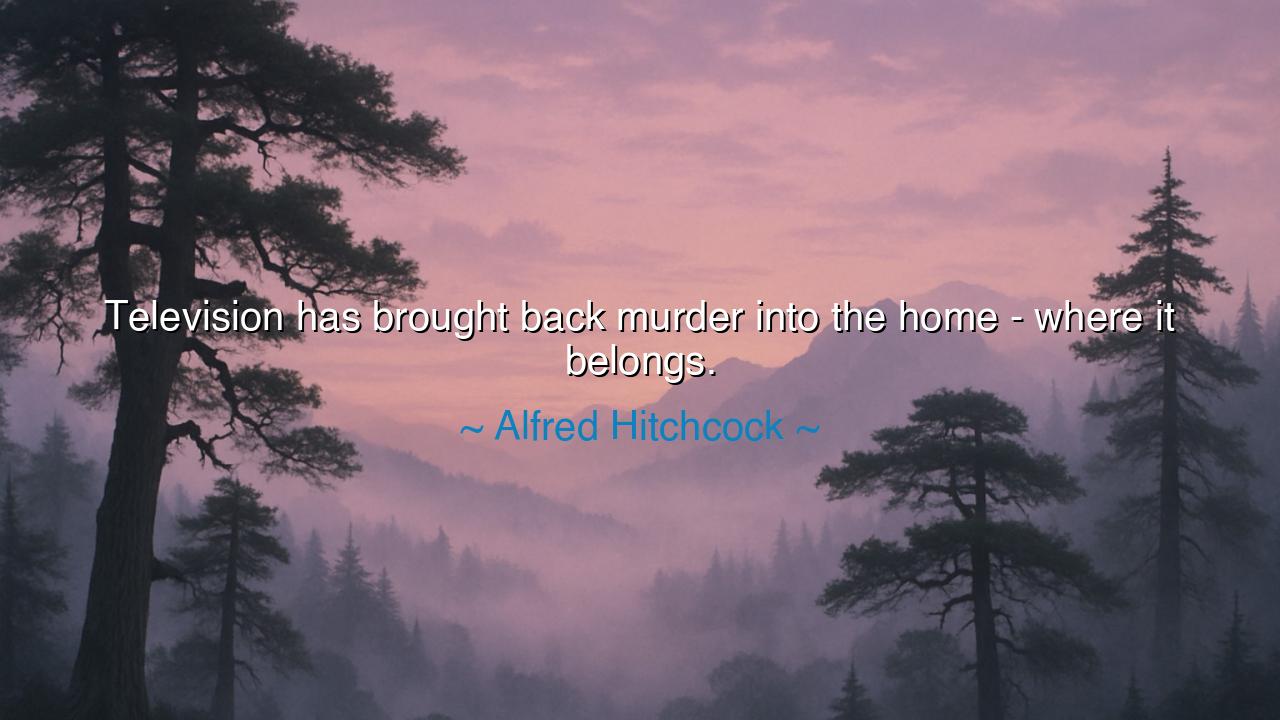
Television has brought back murder into the home - where it






In the dark corners of human nature, where shadows and desires intertwine, there exists a truth too often concealed by the soft light of comfort and complacency. The great Alfred Hitchcock, master of suspense and psychological terror, once uttered these words: “Television has brought back murder into the home—where it belongs.” This declaration, at once chilling and profound, speaks to the heart of a reality we dare not fully acknowledge. For Hitchcock, the murder he refers to is not merely the act of physical violence but the reflection of human darkness, the innate tendencies of fear, desire, and moral ambiguity that, for better or worse, are woven into the very fabric of society.
In the ancient world, stories were passed down through oral tradition, often centered on the tragic fall of heroes, the betrayal of kings, and the violence that marked the boundaries between good and evil. The gods themselves were often portrayed as beings of wrath and vengeance, their stories told in great epics and tragedies. Yet, these stories were filtered through the lens of myth, set in the distant past, far removed from the daily lives of the people. Murder, though ever-present in the hearts of men, was something that happened in the distant battlefield or the courts of kings—far from the hearths of the common folk.
But then came the television, a new force that would change the very nature of storytelling. With its flickering lights and constant presence in the homes of men and women across the world, the television became a window, not just to the world, but to the very soul of humanity. Hitchcock understood this with piercing clarity. In his eyes, the television did not just bring murder into the homes—it brought the darkness of the human soul into the very spaces where we sought comfort and security. Through the flickering images on the screen, we were invited into the world of violence, suspense, and fear, all too real, yet somehow distant enough to feel safe.
Consider, if you will, the example of the gladiatorial games of ancient Rome. The people gathered in the Colosseum, not to witness just death, but to experience it as a spectacle, a ritual of violence and suffering. These public displays of murder were intended not only to entertain, but to remind the people of the power and fear that violence could invoke. In much the same way, the television does today. It brings us closer to the drama of life, the violence of human existence, but at a distance that allows us to watch without feeling its full weight. Yet, Hitchcock’s words remind us that, by bringing this violence into the home, we may lose something vital—the sanctity of our personal spaces and the distortion of our moral compass.
The lesson of Hitchcock’s quote is simple yet profound: we must be mindful of what we invite into our homes. In a world where technology can bring the most disturbing and dark images to our doorstep, we must ask ourselves: do we really wish to witness such things? In ancient times, the stories of the gods and heroes were told to teach wisdom and virtue, to elevate the spirit. But the stories of today, particularly those that focus on murder, crime, and violence, often serve to desensitize us, to normalize the extraordinary and the brutal. Hitchcock’s statement is a call to awareness—to recognize that not all that is brought into our homes should be welcomed.
In the modern age, we must take control of the stories we allow to shape our minds. The television is a powerful force, one that can either uplift or degrade the spirit, depending on the content we choose to consume. If we fill our minds with tales of bloodshed and murder, we risk becoming numb to the sacredness of life itself. Thus, the practical action is clear: choose wisely what you invite into your home. Seek out stories that elevate your understanding of the world, that foster compassion and empathy, not those that cheapen the value of human life through mindless entertainment.
Let this lesson echo through the generations: murder—in its many forms—should not be something we entertain lightly. While art, storytelling, and entertainment have long held violence as a theme, we must strive to understand its place. As the ancients once did, we should use art to challenge the soul, not to numb it. Let us turn away from those narratives that seek only to incite fear, and instead embrace those that guide us toward wisdom and understanding. For the true power of storytelling lies not in glorifying destruction, but in healing the wounds of the heart.






AAdministratorAdministrator
Welcome, honored guests. Please leave a comment, we will respond soon